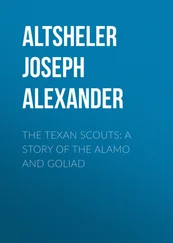Joseph Altsheler - The Sword of Antietam - A Story of the Nation's Crisis
Здесь есть возможность читать онлайн «Joseph Altsheler - The Sword of Antietam - A Story of the Nation's Crisis» — ознакомительный отрывок электронной книги совершенно бесплатно, а после прочтения отрывка купить полную версию. В некоторых случаях можно слушать аудио, скачать через торрент в формате fb2 и присутствует краткое содержание. Издательство: Иностранный паблик, Жанр: foreign_children, foreign_antique, foreign_prose, prose_military, на английском языке. Описание произведения, (предисловие) а так же отзывы посетителей доступны на портале библиотеки ЛибКат.
- Название:The Sword of Antietam: A Story of the Nation's Crisis
- Автор:
- Издательство:Иностранный паблик
- Жанр:
- Год:неизвестен
- ISBN:нет данных
- Рейтинг книги:4 / 5. Голосов: 1
-
Избранное:Добавить в избранное
- Отзывы:
-
Ваша оценка:
- 80
- 1
- 2
- 3
- 4
- 5
The Sword of Antietam: A Story of the Nation's Crisis: краткое содержание, описание и аннотация
Предлагаем к чтению аннотацию, описание, краткое содержание или предисловие (зависит от того, что написал сам автор книги «The Sword of Antietam: A Story of the Nation's Crisis»). Если вы не нашли необходимую информацию о книге — напишите в комментариях, мы постараемся отыскать её.
The Sword of Antietam: A Story of the Nation's Crisis — читать онлайн ознакомительный отрывок
Ниже представлен текст книги, разбитый по страницам. Система сохранения места последней прочитанной страницы, позволяет с удобством читать онлайн бесплатно книгу «The Sword of Antietam: A Story of the Nation's Crisis», без необходимости каждый раз заново искать на чём Вы остановились. Поставьте закладку, и сможете в любой момент перейти на страницу, на которой закончили чтение.
Интервал:
Закладка:
But Shepard had been right. Lee and Jackson, advancing silently and with every avenue of news guarded, were there behind the mountain with sixty thousand men, flushed with victories, and putting a supreme faith in their great commanders who so well deserved their trust. The men of the valley and the Seven Days, wholly confident, asked only to be led against Pope and his army, and most of them expected a battle that very day, while the Northern commander was slipping from the well-laid trap.
Pope’s judgment in this case was good and fortune, too, favored him. Before the last of his men had left the Rapidan Lee himself, with his staff officers, climbed to the summit of Clark’s Mountain. They were armed with the best of glasses, but drifting fogs coming down from the north spread along the whole side of the mountain and hung like a curtain between it and the retreating army. None of their glasses could pierce the veil, and it was not until nearly night that rising winds caught the fog and took it away. Then Lee and his generals saw a vast cloud of dust in the northwest and they knew that under it marched Pope’s retreating army.
The Southern army was at once ordered forward in pursuit and in the night the vanguard, wading the Rapidan, followed eagerly. Dick and his comrades did not know then that they were followed so closely, but they were destined to know it before morning. The regiment of Colonel Winchester, one of the best and bravest in the whole service, formed a part of the rearguard, and Dick, Warner and Pennington rode with their chief.
The country was broken and they crossed small streams. Sometimes they were in open fields, and again they passed through long stretches of forest. There was a strong force of cavalry with the regiment, and the beat of the horses’ hoofs made a steady rolling sound which was not unpleasant.
But Dick found the night full of sinister omens. They had left the Rapidan in such haste that there was still a certain confusion of impressions. The gigantic scale of everything took hold of him. One hundred and fifty thousand men, or near it, were marching northward in two armies which could not be many miles apart. The darkness and the feeling of tragedy soon to come oppressed him.
He listened eagerly for the sounds of pursuit, but the long hours passed and he heard nothing. The rear guard did not talk. The men wasted no strength that way, but marched stolidly on in the moonlight. Midnight passed and after a while it grew darker. Colonel Winchester and his young officers rode at the very rear, and Pennington suddenly held up his hand.
“What is it?” asked Colonel Winchester.
“Somebody following us, sir. I was trained out on the plains to take notice of such things. May I get down and put my ear to the ground? I may look ridiculous, sir, but I can make sure.”
“Certainly. Go ahead.”
Pennington sprang down and put his ear to the road. He did not listen long, but when he stood up again he said:
“Horsemen are coming. I can’t tell how many, but several hundreds at least.”
“As we’re the very last of our own army, they must be Southern cavalry,” said Colonel Winchester. “If they want to attack, I dare say our boys are willing.”
Very soon they heard clearly the gallop of the cavalry, and the men heard it also. They looked up and turned their faces toward those who must be foes. Despite the dimness Dick saw their eyes brighten. Colonel Winchester had judged rightly. The boys were willing.
The rear guard turned back and waited, and in a few minutes the Southern horsemen came in sight, opening fire at once. Their infantry, too, soon appeared in the woods and fields and the dark hours before the dawn were filled with the crackle of small arms.
Dick kept close to Colonel Winchester who anxiously watched the pursuit, throwing his own regiment across the road, and keeping up a heavy fire on the enemy. The Union loss was not great as most of the firing in the dusk, of necessity, was at random, and Dick heard bullets whistling all about him. Some times the bark flew from trees and now and then there was a rain of twigs, shorn from the branches by the showers of missiles.
It was arduous work. The men were worn by the darkness, the uncertainty and the incessant pursuit. The Northern rear guard presented a strong front, retreating slowly with its face to the enemy, and always disputing the road. Dick meanwhile could hear through the crash of the firing the deep rumble of Pope’s great army with its artillery and thousands of wagons continually marching toward the Rappahannock. His mind became absorbed in a vital question. Would Lee and Jackson come up before they could reach the bigger river? Would a battle be forced the next day while the Union army was in retreat? He confided his anxieties to Warner who rode by his side.
“I take it that it’s only a vanguard that’s pursuing us,” said the Vermonter. “If they were in great force they’d have been pushing harder and harder. We must have got a good start before Lee and Jackson found us out. We know our Jackson, Dick, and he’d have been right on top of us without delay.”
“That’s right, George. It must be their cavalry mostly. I suppose Jeb Stuart is there leading them. At any rate we’ll soon know better what’s doing. Look there toward the east. Don’t you see a ray of light behind that hill?”
“I see it, Dick.”
“Is it the first ray of the morning, or is it just a low star?”
“It’s the dawn, Dick, and mighty glad I am to see it. Look how fast it comes!”
The sun shot up, over the hill. The sky turning to silver soon gave way to gold, and the clear August light poured in a flood over the rolling country.
Dick saw ahead of him a vast cloud of dust extending miles from east to west, marking where the army of Pope pushed on its retreat to the Rappahannock. There was no need to search for the Northern force. The newest recruit would know that it was here.
The Southern vanguard was behind them and not many hundred yards away. Dick distinctly saw the cavalry, riding along the road, and hundreds of skirmishers pushing through the woods and fields. He judged that the force did not number many thousands and that it could not think of assailing the whole Union army. But with the coming of day the vigor of the attack increased. The skirmishers fired from the shelter of every tree stump, fence or hillock and the bullets pattered about Dick and his comrades.
The Union rear guard maintained its answering fire, but as it was retreating it was at a disadvantage. The regiments began to suffer. Many men were wounded. The fire became most galling. A sudden charge by the rearguard was ordered and it was made with spirit. The Southern van was driven back, but when the retreat was resumed the skirmishers and the cavalry came forward again, always firing at their retreating foe.
“I judge that it’s going to be a very hot morning,” said Colonel Winchester, wiping away a few drops of blood, where a bullet had barely touched his face. “I think the wind of that bullet hurt me more than its kiss. There will be no great battle to-day. We can see now that they are not yet in strong enough force, but we’ll never know a minute’s rest until we’re behind the Rappahannock. Oh, Dick, if McClellan’s army were only here also! This business of retreating is as bitter as death itself!”
Dick saw the pain on his colonel’s face and it was reflected on his own.
“I feel it, sir, in the same way. Our men are just as eager as the Johnnies to fight and they are as brave and tenacious. What do you think will happen, sir?”
“We’ll reach the Rappahannock and take refuge behind it. We command the railroad bridge there, and can cross and destroy it afterward. But the river is broad and deep with high banks and the army of the enemy cannot possibly force the passage in any way while we defend it.”
Читать дальшеИнтервал:
Закладка:
Похожие книги на «The Sword of Antietam: A Story of the Nation's Crisis»
Представляем Вашему вниманию похожие книги на «The Sword of Antietam: A Story of the Nation's Crisis» списком для выбора. Мы отобрали схожую по названию и смыслу литературу в надежде предоставить читателям больше вариантов отыскать новые, интересные, ещё непрочитанные произведения.
Обсуждение, отзывы о книге «The Sword of Antietam: A Story of the Nation's Crisis» и просто собственные мнения читателей. Оставьте ваши комментарии, напишите, что Вы думаете о произведении, его смысле или главных героях. Укажите что конкретно понравилось, а что нет, и почему Вы так считаете.












